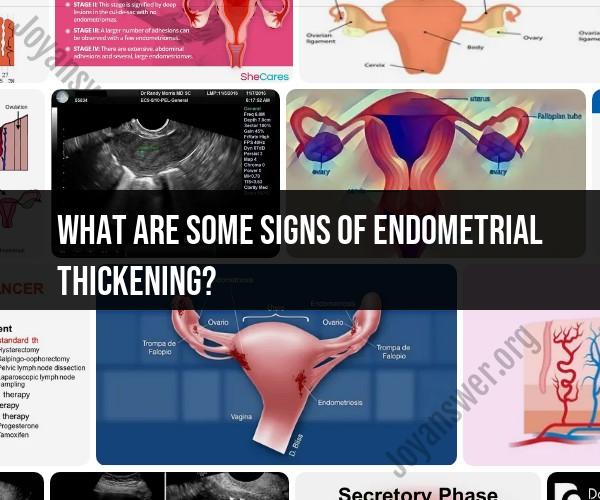What are some signs of endometrial thickening?
Endometrial thickening, also known as endometrial hyperplasia, may not always present noticeable signs or symptoms in its early stages. However, as the condition progresses or if it is associated with other underlying issues, some common signs and symptoms to watch for include:
Abnormal Uterine Bleeding: One of the most common signs of endometrial thickening is abnormal uterine bleeding, which can manifest as:
- Heavy menstrual bleeding: Menstrual periods that are much heavier or longer than usual.
- Irregular menstrual cycles: Changes in the regularity of menstrual periods, including irregular intervals between periods.
- Postmenopausal bleeding: Vaginal bleeding that occurs after menopause, which is any bleeding that happens 12 months or more after the last menstrual period. This is a concerning symptom and should be evaluated promptly.
Pelvic Pain: Some individuals with endometrial thickening may experience pelvic pain or discomfort. This can vary in intensity and may be associated with menstrual periods.
Pelvic Pressure or Fullness: A feeling of fullness or pressure in the lower abdomen or pelvis may occur, especially if the thickened endometrial tissue leads to the enlargement of the uterus.
Changes in Menstrual Flow: Changes in the pattern of menstrual flow, such as clots or spotting between periods, can be associated with endometrial thickening.
Pain During Intercourse: In some cases, endometrial thickening can lead to pain or discomfort during sexual intercourse (dyspareunia).
Unexplained Weight Loss: While less common, unexplained weight loss can be a symptom of advanced endometrial hyperplasia or endometrial cancer.
It's important to note that endometrial thickening can result from various factors, including hormonal imbalances, medical conditions, or medications. While not all cases of endometrial thickening lead to cancer, it is essential to promptly investigate any concerning symptoms, particularly postmenopausal bleeding, as this can be associated with a higher risk of endometrial cancer.
If you experience any of these signs or symptoms, especially if they are persistent or severe, it is advisable to consult with a healthcare provider, preferably a gynecologist. They can conduct a thorough evaluation, which may include a pelvic examination, imaging studies (such as transvaginal ultrasound), and, if necessary, a biopsy of the endometrial tissue to determine the cause and appropriate treatment. Early detection and treatment can be crucial in managing endometrial conditions effectively.











